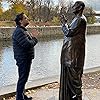Poll
Poll added by: Trevor
Comments Showing 1-5 of 5 (5 new)
date newest »
newest »
 newest »
newest »
message 1:
by
Trevor
(new)
Feb 23, 2017 02:39PM
 Mod
Mod
reply
|
flag
 Haven't read Kokoro, but To the Lighthouse is a masterpiece. Never read anything like it, don't expect to.
Haven't read Kokoro, but To the Lighthouse is a masterpiece. Never read anything like it, don't expect to.
 I have read Kokoro very recently. But for me it isn't impressive enough to topple Woolf
I have read Kokoro very recently. But for me it isn't impressive enough to topple Woolf"We who are born to this age of freedom and independence and the self must undergo this loneliness. It's the price we pay for these times of ours."
The writing is at times exquisite and the psychological aspects of the characters explored with subtlety and depth, in particular the contrast between the rather guileless and uncurious narrator ("I wondered. I could not repress my doubt. But it lasted only a moment, them was buried.), a true modern youth of the Meiji era, the withdrawn and misanthropic elder Sensei, torn between two eras, Sensei's younger student-self as revealed in his "confession" (in contrast to the narrator, enduring agonised jealous contemplation of every nuance of his interaction with his friend and fellow student K, his landlady, her daughter: The smallest trifle, something that would seem to be quite insignificant to anyone else, could set it off.) and K, from a more traditional era, but racked with conflict between his passions and his ascetic religious ideals.
One major issue for me though is that much of the interaction between the narrator and his mentor, Sensei, is absent from the page. We're left with little evidence as to why he has such a strong admiration for Sensei, indeed even what Sensei does to deserve that term. We see the narrator draw unfavourable contrasts between his father and Sensei e.g. this contrasting his discussions with his mentor to his father's pursuit of playing the board game, Shogi:
"Sensei, to whom I had never gone for mere amusement, had influenced my mind far more deeply than would any idle entertainment. 'My mind' sounds far too cool and detached - let me say 'my breast. It would have felt no exaggeration to say that Sensei's strength seemed to have entered my body, and my very blood flowed with his life force."
Or this contrasting his comparing his father's unbridled joy at the narrator's Graduation to Sensei's almost disdainful reaction.
"Sensei, I thought, was more cultured and admirable than my father, with his unashamed delight. In the final analysis, what I felt was displeasure at the reek of country boorishness in my father's innocence."
Both of these could hint that the secret lies in the narrator himself, perhaps shame at his country roots, except we see nothing of the positive or cultured side of Sensei's character. Sensei himself writes to the narrator "You and I have often argued over questions of modern thought, as I'm sure you remember." - the narrator may remember it but the reader doesn't.
Also an observation on the influence of this book on one of my favourite modern-day authors Kazuo Ishiguro. He has always refuted comparisons to classic Japanese authors. In 1990 he said: "If I wrote under a pseudonym and got somebody else to pose for my jacket photographs, I'm sure nobody would think of saying, 'This guy reminds me of that Japanese writer.
But I have to say, if I had been presented with Kokoro and told it was the new novel from Ishiguro (past pastiche admittedly) I would not have doubted it.
 The excellent Tony's Reading List was what commended it to me - so for a stronger case for Kokoro try:
The excellent Tony's Reading List was what commended it to me - so for a stronger case for Kokoro try: http://tonysreadinglist.blogspot.co.u...
Never read any Soseki, but have added this one to my wishlist. It would have to be spectacular to beat Woolf though.

























